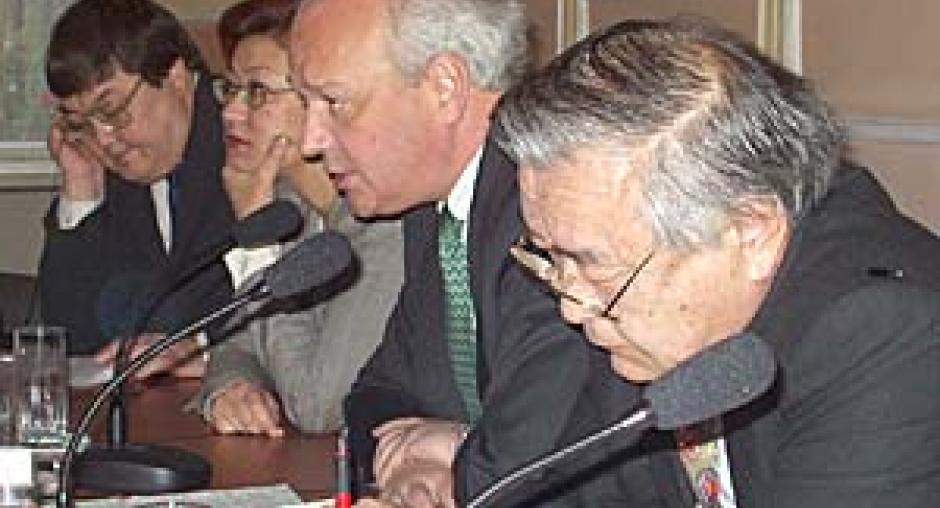Newsroom
Democratization promotes Central Asian security, OSCE Bishkek Academy workshop notes
BISHKEK 2 April 2003

Director of the Geneva Centre for Security Policy and former ODIHR Director Stoudmann (second right), at an OSCE Academy workshop on democratization and security in Bishkek, 31 March 2003. (OSCE) Photo details
BISHKEK, 2 April 2003 - Democracy is no guarantee of security and stability, but it reduces risks, Ambassador Gerard Stoudmann, Director of the Geneva Centre for Security Policy, told an experts' meeting in the Kyrgyz capital, organized by the OSCE Academy in Kyrgyzstan.
Speaking at a workshop on "Security and Democratization - Contradiction or Interdependence? The Central Asian Prospect", which ended on Monday, the former Director of the OSCE's Office for Democratic Institutions and Human Rights (ODIHR) emphasized "the obligation of the OSCE and the international community to support the modernization process in Central Asia and not to impose ready-made solutions".
Many senior experts on security and democracy also attended this event, the first held by the OSCE Academy in Kyrgyzstan in its own premises since its establishment last December.
"The OSCE's task is to support the transition process, help create a modern society and face the challenges of the 21st Century," Ambassador Stoudmann said.
The Head of the OSCE Centre in Bishkek, Ambassador Aydin Idil called the event "an important workshop in times when security concerns dominate the world agenda."
Sergei Smirnoff from the Institute of Strategic Research of Kazakhstan said that there was no working system of regional security in Central Asia at the moment. "Security must be reached in co-operation with Russia and China," he added. "Central Asia also needs other partners like the US and the European Union."
Another senior expert on the OSCE's activities, Prof. Wolfgang Zellner, Director of the Centre for OSCE Research (CORE) in Hamburg, emphasized the significance of the Organization's comprehensive approach to security for countries in transition.
"The OSCE should not shift emphasis from one dimension to another, but better interlink the three dimensions - human, politico-military, and economic and environmental," he said.
The security concerns of the OSCE's Central Asian participating States were also discussed at the workshop. Prof. Saidanvar Shokhumorov, Deputy Director of the Institute of Oriental Studies of Tajikistan, said the success of democratic transformation in Afghanistan was decisive for the stability and security of the whole region.
Participants at the workshop called for the OSCE Academy to discuss and investigate risks to the democratization process and ways of preventing violent consequences.
The event was also attended by the Director of the Austrian Peace Centre, Arno Truger, Prof. Georg Frerks from the Clingendael Institute in The Hague, and representatives of numerous international and regional academic institutions, as well as Kyrgyz policy and opinion makers.
Speaking at a workshop on "Security and Democratization - Contradiction or Interdependence? The Central Asian Prospect", which ended on Monday, the former Director of the OSCE's Office for Democratic Institutions and Human Rights (ODIHR) emphasized "the obligation of the OSCE and the international community to support the modernization process in Central Asia and not to impose ready-made solutions".
Many senior experts on security and democracy also attended this event, the first held by the OSCE Academy in Kyrgyzstan in its own premises since its establishment last December.
"The OSCE's task is to support the transition process, help create a modern society and face the challenges of the 21st Century," Ambassador Stoudmann said.
The Head of the OSCE Centre in Bishkek, Ambassador Aydin Idil called the event "an important workshop in times when security concerns dominate the world agenda."
Sergei Smirnoff from the Institute of Strategic Research of Kazakhstan said that there was no working system of regional security in Central Asia at the moment. "Security must be reached in co-operation with Russia and China," he added. "Central Asia also needs other partners like the US and the European Union."
Another senior expert on the OSCE's activities, Prof. Wolfgang Zellner, Director of the Centre for OSCE Research (CORE) in Hamburg, emphasized the significance of the Organization's comprehensive approach to security for countries in transition.
"The OSCE should not shift emphasis from one dimension to another, but better interlink the three dimensions - human, politico-military, and economic and environmental," he said.
The security concerns of the OSCE's Central Asian participating States were also discussed at the workshop. Prof. Saidanvar Shokhumorov, Deputy Director of the Institute of Oriental Studies of Tajikistan, said the success of democratic transformation in Afghanistan was decisive for the stability and security of the whole region.
Participants at the workshop called for the OSCE Academy to discuss and investigate risks to the democratization process and ways of preventing violent consequences.
The event was also attended by the Director of the Austrian Peace Centre, Arno Truger, Prof. Georg Frerks from the Clingendael Institute in The Hague, and representatives of numerous international and regional academic institutions, as well as Kyrgyz policy and opinion makers.
